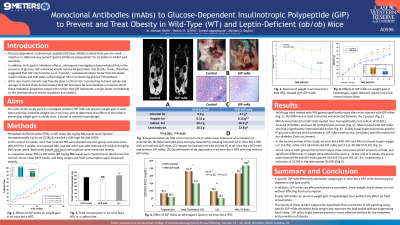Back


Poster Session A - Sunday Afternoon
Category: Obesity
A0596 - Monoclonal Antibodies (mAbs) to Glucose-Dependent Insulinotropic Polypeptide (GIP) Prevent and Treat Obesity in Wild-Type (wt) and Leptin-Deficient (ob/ob) Mice
Sunday, October 23, 2022
5:00 PM – 7:00 PM ET
Location: Crown Ballroom

Has Audio

Michael Wolfe, MD, FACG
Case Western Reserve University
Bal Harbour, FL
Presenting Author(s)
Award: Outstanding Research Award in the Obesity Category
Award: Presidential Poster Award
Michael Wolfe, MD, FACG1, Patrick H. Griffin, MD2, Sireesh Appajosyula, PharmD2, Michael O. Boylan, PhD2
1Case Western Reserve University, Bal Harbour, FL; 29 Meters, Raleigh, NC
Introduction: GIP, a physiological incretin, is also insulin mimetic and thereby plays a critical role in promoting nutrient uptake and storage. We previously reported development of a GIP mAb that decreased weight gain in wt C57BL/6 mice fed a high-fat diet without any effect on food intake. The aim of this study was to investigate whether our GIP mAb will promote weight loss in wt mice, and (2) to determine the effects of this mAb in preventing weight gain in ob/ob mice, a model of extreme hyperphagia.
Methods: PBS or GIP mAbs (50 mg/kg BW/week) were injected ip to wt C57BL/6 mice fed a 60% high-fat diet HFD. At the end of 12 weeks, mice that received PBS were divided into two groups and were fed a 40% HFD for 5 weeks; one received PBS, and the other was administered GIP mAbs (50 mg/kg BW) ip per week. Both body weight and food consumption were measured weekly. In a separate study, PBS or GIP mAbs (60 mg/kg BW/week) were injected ip to ob/ob mice fed normal mouse chow for 8 weeks, and body weight and food consumption were measured weekly.
Results: As previously reported, wt mice treated with PBS gained significantly more than mice that were injected with GIP mAbs. No difference in food consumed was detected between the 2 groups. In addition, magnetic resonance demonstrated that GIP mAb-treated mice had significantly less subcutaneous (P< 0.001), omental (P< 0.001), and hepatic fat (P< 0.03) than control mice. In the second portion of the study, wt mice fed a 40% HFD and PBS continued to gain weight (+2.1±0.9%), while mice administered GIP mAbs lost 4.1±1.4% BW (P< 0.01). Leptin-deficient ob/ob mice in both groups fed regular mouse chow consumed similar amounts of food, and significant differences in weight were detected by week 4. At the end of 8 weeks, the group administered PBS and GIP mAbs gained 250.4±9.1% and 192.4±7.3%, respectively, a reduction of 21.9% in the latter group (P< 0.01).
Discussion: A specific GIP mAb effectively attenuates weight gain in mice fed a HFD while decreasing fat deposition. In addition, GIP mAbs can effectively produce consistent, linear weight loss in obese wt mice without any change in food consumption. Finally, GIP mAbs can prevent weight gain in hyperphagic mice without any effect on food consumption. The results of these studies support the hypothesis that a reduction in GIP signaling appears to affect body weight without suppressing food intake and might provide a useful method for the treatment and prevention of obesity.
Disclosures:
Michael Wolfe, MD, FACG1, Patrick H. Griffin, MD2, Sireesh Appajosyula, PharmD2, Michael O. Boylan, PhD2. A0596 - Monoclonal Antibodies (mAbs) to Glucose-Dependent Insulinotropic Polypeptide (GIP) Prevent and Treat Obesity in Wild-Type (wt) and Leptin-Deficient (ob/ob) Mice, ACG 2022 Annual Scientific Meeting Abstracts. Charlotte, NC: American College of Gastroenterology.
Award: Presidential Poster Award
Michael Wolfe, MD, FACG1, Patrick H. Griffin, MD2, Sireesh Appajosyula, PharmD2, Michael O. Boylan, PhD2
1Case Western Reserve University, Bal Harbour, FL; 29 Meters, Raleigh, NC
Introduction: GIP, a physiological incretin, is also insulin mimetic and thereby plays a critical role in promoting nutrient uptake and storage. We previously reported development of a GIP mAb that decreased weight gain in wt C57BL/6 mice fed a high-fat diet without any effect on food intake. The aim of this study was to investigate whether our GIP mAb will promote weight loss in wt mice, and (2) to determine the effects of this mAb in preventing weight gain in ob/ob mice, a model of extreme hyperphagia.
Methods: PBS or GIP mAbs (50 mg/kg BW/week) were injected ip to wt C57BL/6 mice fed a 60% high-fat diet HFD. At the end of 12 weeks, mice that received PBS were divided into two groups and were fed a 40% HFD for 5 weeks; one received PBS, and the other was administered GIP mAbs (50 mg/kg BW) ip per week. Both body weight and food consumption were measured weekly. In a separate study, PBS or GIP mAbs (60 mg/kg BW/week) were injected ip to ob/ob mice fed normal mouse chow for 8 weeks, and body weight and food consumption were measured weekly.
Results: As previously reported, wt mice treated with PBS gained significantly more than mice that were injected with GIP mAbs. No difference in food consumed was detected between the 2 groups. In addition, magnetic resonance demonstrated that GIP mAb-treated mice had significantly less subcutaneous (P< 0.001), omental (P< 0.001), and hepatic fat (P< 0.03) than control mice. In the second portion of the study, wt mice fed a 40% HFD and PBS continued to gain weight (+2.1±0.9%), while mice administered GIP mAbs lost 4.1±1.4% BW (P< 0.01). Leptin-deficient ob/ob mice in both groups fed regular mouse chow consumed similar amounts of food, and significant differences in weight were detected by week 4. At the end of 8 weeks, the group administered PBS and GIP mAbs gained 250.4±9.1% and 192.4±7.3%, respectively, a reduction of 21.9% in the latter group (P< 0.01).
Discussion: A specific GIP mAb effectively attenuates weight gain in mice fed a HFD while decreasing fat deposition. In addition, GIP mAbs can effectively produce consistent, linear weight loss in obese wt mice without any change in food consumption. Finally, GIP mAbs can prevent weight gain in hyperphagic mice without any effect on food consumption. The results of these studies support the hypothesis that a reduction in GIP signaling appears to affect body weight without suppressing food intake and might provide a useful method for the treatment and prevention of obesity.
Disclosures:
Michael Wolfe: 9 Meters – Consultant. Lobesity LLC – Employee.
Patrick Griffin: 9 Meters – Employee, Stock-publicly held company(excluding mutual/index funds).
Sireesh Appajosyula: 9 Meters – Employee, Stock-publicly held company(excluding mutual/index funds).
Michael Boylan: 9 Meters – Consultant. Lobesity LLC – Employee.
Michael Wolfe, MD, FACG1, Patrick H. Griffin, MD2, Sireesh Appajosyula, PharmD2, Michael O. Boylan, PhD2. A0596 - Monoclonal Antibodies (mAbs) to Glucose-Dependent Insulinotropic Polypeptide (GIP) Prevent and Treat Obesity in Wild-Type (wt) and Leptin-Deficient (ob/ob) Mice, ACG 2022 Annual Scientific Meeting Abstracts. Charlotte, NC: American College of Gastroenterology.

